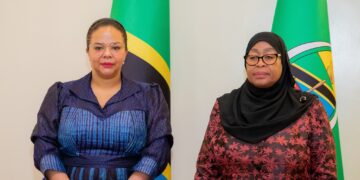The Democratic Republic of Congo and Rwanda are expected to engage in a “constructive dialogue” to create favourable conditions for the sustainable return of refugee populations in both countries.
The decision, taken in Geneva, Switzerland, on Monday, will see Kinshasa and Kigali working on better ways to assume this responsibility, in line with the signing of the agreement under the auspices of the United Nations High Commissioner for Refugees.
According to the joint communiqué signed by Christophe Lutundula, the Congolese deputy prime minister in charge of foreign affairs, Kayisire Marie Solange, the Rwandan minister in charge of emergency management, and Filippo Grandi, the UN High Commissioner for Refugees, a first tripartite technical meeting between the DRC, Rwanda and the UNHCR will be held in Nairobi within a month “to define the practical modalities for the reactivation of all the commitments and structures contained in the 2010 tripartite agreements”, the joint communiqué reads.
On 17 February 2010, the Congolese government, the Rwandan government and the United Nations High Commissioner for Refugees signed an agreement in Kigali on the voluntary repatriation of Congolese refugees living in Rwanda and Rwandan refugees living in Congo. The two governments and the United Nations High Commissioner for Refugees then signed the modalities for the repatriation of these refugees on 30 July in Goma, DRC.
Today, in a context of conflict caused by the resurgence of the M23, the Congolese rebel group that the Congolese authorities accuse of supporting Rwanda, the issue of refugees from the two countries is often the cause of a feud between Kinshasa and Kigali.
In a joint communiqué signed in Geneva on Monday 15 May, the Rwandan and Congolese governments pledged to “address the challenges related to the security of returnees, the exchange of information on living conditions in areas of return, including community sensitisation, and reintegration”.
Christophe Lutundula and Kayisire Marie Solange pledge that their two countries will “continue to ensure access to asylum for people in need of international protection”.





































































